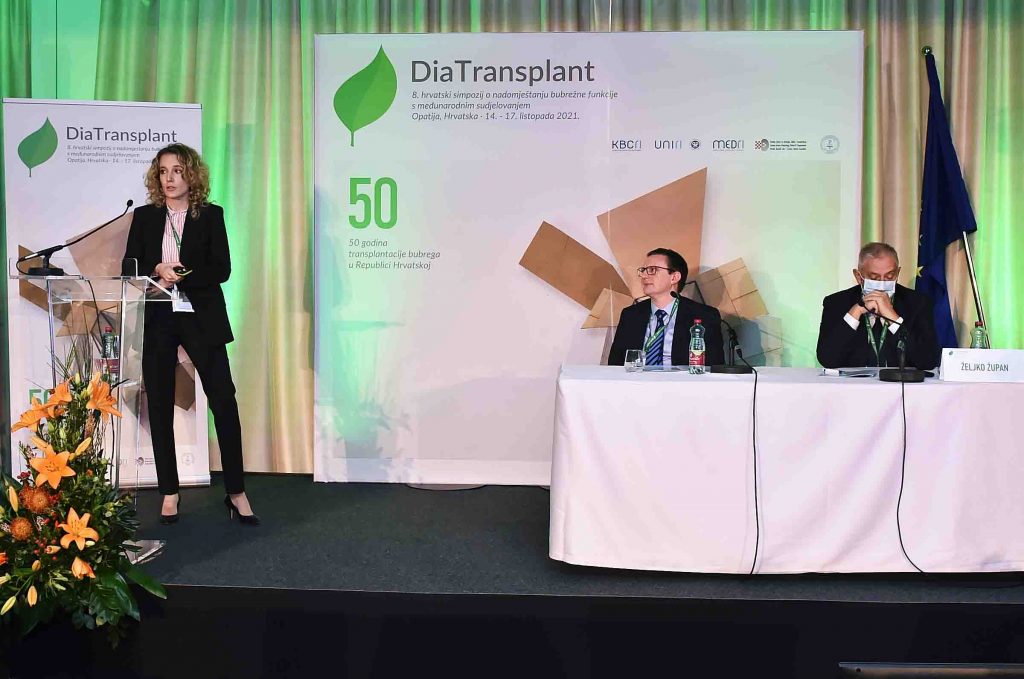Emerging and Neglected Hepatotropic Viruses after Solid Organ and Hematopoietic Stem Cell Transplantation
HepViroTRANSPLANT
HRZZ Research Project (IP-2020-02-7407)
Project leader (PI): Anna Mrzljak, MD, PhD, FEBGH; associate professor
Host institution: University of Zagreb School of Medicine, Zagreb, Croatia
Abstract
Human viral hepatitis results from a wide range of pathogens beyond the classic primary hepatotropic viruses such as hepatitis A-E. Neglected secondary hepatotropic viruses (HVs) such as human herpes viruses 6/7 (HHV-6, HHV-7), parvovirus B19 (B19V), bocavirus (HBoV) may cause hepatic injury ranging from mild to fulminant hepatitis. In the impaired immunological setting, such as in patients after solid-organ transplantation (SOT) or after hematopoietic stem cell transplantation (HSCT), they may have particular effects and result in prolonged and disseminated disease. Several candidate viruses remain to be investigated as possible liver pathogens, including torque-teno virus (TTV), SEN virus (SENV), human pegivirus (HPgV), and non-primate hepaciviruses (NPHV).
Given that Croatia has a high HSCT activity and one of the highest liver (32.20 pmp) and kidney (43.40 pmp) transplantation rates in the world, it would be of particular importance to investigate the impact of HVs in the context of transplantation outcomes.
This prospective study will include SOT (liver/kidney) and HSCT candidates in order to identify the prevalence of nine emerging and neglected hepatotropic viruses (HEV, HHV-6, HHV-7, B19V, HBoV, TTV, SENV, HPgV, NPHV) before and within the first year after transplantation by detection of viral DNA/RNA and specific antibodies. The explanted liver samples after LT will also be tested. It is important to note that secondary HVs are not included in routine diagnostic testing; therefore, no or scarce data exist regarding the epidemiology in the region. The study will define the epidemiology, clinical characteristics, and impact of hepatotropic viruses in the pre-and post-transplant setting to improve transplant outcomes. Detection and genetic characterization of new HVs will enable a better understanding of the epidemiology of viral hepatitis in Croatia and South-East Europe, which will set a platform to improve public health measures and post-transplant management and outcomes.
Project team members
Anna Mrzljak, Assoc. Prof. MD, Principal Investigator
School of Medicine, University of Zagreb
https://scholar.google.com/citations?hl=en&user=z6kk_pUAAAAJ

Ljubo Barbić, Prof. DVM, Investigator
Faculty of Veterinary Medicine University of Zagreb, Croatia
https://scholar.google.com/citations?hl=en&user=D5FtYWsAAAAJ

Ana Bainrauch (Jelić), MD, PhD Student, Investigator
Merkur University Hospital, Zagreb, Croatia
https://www.researchgate.net/profile/Ana-Jelic

Maja Bogdanić, MD, PhD Student, Investigator
Croatian Institute of Public Health, Zagreb, Croatia
https://www.researchgate.net/profile/Maja-Bogdanic-2

Željka Hruškar, mag.mol.biol., Investigator
Croatian Institute of Public Health, Zagreb, Croatia

Maja Ilić, MD, Investigator
Croatian Institute of Public Health, Zagreb, Croatia
https://www.researchgate.net/profile/Maja-Ilic-4

Lorena Jemeršić, Assoc. Prof. DVM, Investigator
Croatian Veterinary Institute, Zagreb, Croatia
https://scholar.google.com/citations?hl=en&user=np2ju6cAAAAJ

Željka Jureković, MD, Investigator
Merkur University Hospital
https://www.linkedin.com/in/zeljka-jurekovic-27629217/?originalSubdomain=hr

Karla Mišura, MD, PhD Student, Investigator
Merkur University Hospital, Zagreb, Croatia
https://www.linkedin.com/in/karla-mi%C5%A1ura-a9881661/?originalSubdomain=hr

Nenad Pandak, MD, PhD, Investigator
The Royal Hospital Muscat, Oman
https://scholar.google.com/citations?hl=en&user=H417ccUAAAAJ

Jadranka Pavičić Šarić, Assist. Prof. MD, Investigator
Merkur University Hospital, Zagreb, Croatia
https://scholar.google.com/citations?hl=en&user=zgJLC3sAAAAJ

Jelena Prpić, mag.mol.biol, PhD. Investigator
Croatian Veterinary Institute, Zagreb, Croatia
https://scholar.google.com/citations?user=tA8sx5IAAAAJ&hl=en&oi=ao

Vladimir Savić Assist. Prof. DVM, Investigator
Croatian Veterinary Institute
https://scholar.google.com/citations?hl=en&user=z4RzuRcAAAAJ

Vladimir Stevanović, Assist. Prof. DVM, Investigator
Faculty of Veterinary Medicine University of Zagreb
https://scholar.google.com/citations?hl=en&user=AdTWhn8AAAAJ

Bojana Šimunov, MD, PhD, Investigator
Merkur University Hospital, Zagreb, Croatia
http://scholar.google.com/citations?user=QNJhy5cAAAAJ&hl=en

Irena Tabain, Assoc. Prof. MD, Investigator
Croatian Institute of Public Health, Zagreb, Croatia
https://www.researchgate.net/profile/Irena-Tabain

Tatjana Vilibić Čavlek, Assoc. Prof. MD, Investigator
Croatian Institute of Public Health, Zagreb, Croatia
https://scholar.google.com/citations?hl=en&user=oEd2oVMAAAAJ

Adriana Vince, Prof. MD, Investigator
School of Medicine, University of Zagreb
https://scholar.google.com/citations?hl=en&user=F5oKXo8AAAAJ

Project funding and duration
Project duration: 48 months (01.01.2021. – 01.12.2024.)
Project funding: 1,500.000 HRK
Publikacije
1. Mrzljak A, Jamersic L, Savic V, Balen I, Ilic M, Jurekovic Z, Pavicic-Saric J, Mikulic D, Vilibic-Cavlek T. Hepatitis E Virus in Croatia in the "One-Health" context" Pathogens. 2021 Jun 4;10(6):699. doi:10.3390/pathogens10060699
2. Anna Mrzljak, Vladimir Stevanović, Željka Jureković, Slobodanka Ostojić Kolonić, Željka Hruškar, Bojana Gardijan, Jadranka Pavičić Šarić, Danko Mikulić, Ana Bainrauch, Karla Mišura Jakobac, Maja Ilić, Irena Tabain, Maja Bogdanić, Adriana Vince, Vladimir Savić, Ljubo Barbić, Nenad Pandak, Tatjana Vilibić-Čavlek. Bocavirus viremia in solid-organ and hematopoetic cell transplant recipients - Results of a Pilot Study from HepViroTransplant Project. IX Kongres hrvatskog gastroenterološkog društva s međunarodnim sudjelovanjem, virtualno, 28-30. 10. 2021.
3. Petra Dinjar Kujundžić, Tatjana Vilibić-Čavlek, Alan Ayoub, Adriana Vince, Anna Mrzljak. Seroprevalencija hepatitisa E u bolesnika nakon transplantacije solidnih organa u Hrvatskoj.IX. Kongres hrvatskog gastroenterološkog društva s međunarodnim sudjelovanjem, virtualno, 28-30. 10. 2021.
4. Ivan Balen, Tatjana Vilibić-Čavlek, Dario Sabadi, Ljiljana Perić, Irena Tabain, Tanja Potočnik Hunjadi, Elizabeta Dvorski, Tamara Butigan, Gordana Kolaric-Sviben, Ljubo Barbić, Vladimir Stevanović, Maja Sremac, Anna Mrzljak. Ekstrahepatalne manifestacije hepatitis E virusne infekcije – neuroinvazivna infekcija. IX. Kongres Hrvatskoga gastroenterološkog društva s međunarodnim sudjelovanjem, virtualno 28.-30.10.2021.
5. Šimunov B, Jureković Ž, Vilibić-Čavlek T, Mikulić D, Pavičić-Šarić J, Ilić M, Bogdanić M, Tabain I, Mrzljak A. Parvovirus B19- Serological Status in Kidney and Pancreas Transplant Candidates – Preliminary Results of a Pilot Study From The Hepvirotransplant Project. Diatransplant 2021, Opatija 14-17. 10. 2021.
Sudjelovanje na simpoziju
PARVOVIRUS B19- SEROLOGICAL STATUS IN KIDNEY AND PANCREAS TRANSPLANT CANDIDATES – PRELIMINARY RESULTS OF A PILOT STUDY FROM THE HEPVIROTRANSPLANT PROJECT
Šimunov B1, Jureković Ž1, Vilibić-Čavlek T2,3, Mikulić D1, Pavičić-Šarić J1, Ilić M4, Bogdanić M2, Tabain I2, Mrzljak A3,5
1 Transplant Centre, Merkur University Hospital, Zagreb, Croatia
2 Department of Virology, Croatian Institute of Public Health, Zagreb, Croatia
3 School of Medicine, University of Zagreb, Croatia
4 Department of Epidemiology, Croatian Institute of Public Health, Zagreb, Croatia
5 Department of Gastroenterology and Hepatology, University Hospital Center Zagreb, Zagreb, Croatia
Aim: Parvovirus B19 is associated with a wide range of disease manifestations. The major presentation is erythema infectiosum. However, in immunocompromised patients, persistent infection may cause pure red cell aplasia and chronic anemia. The parvovirus B19 seroprevalence varies with age and geographical location. This study aimed to determine the serological status of kidney and pancreas transplant candidates.
Materials and Methods: Patients who were transplanted (kidney or simultaneous kidney and pancreas) at Merkur University Hospital from January to July 2021, were included in the analysis. The serum samples were collected before the transplant. Parvovirus B19 IgG and IgM antibodies were performed using a commercial ELISA test (Euroimmun, Lübeck, Germany). Results were interpreted according to the manufacturer’s recommendations as follows: IgM ratio <0.8 negative, 8.8-1.1 borderline, >1.1 positive; IgG RU/ml <4 negative, 4-5.5 borderline, >5.5 positive. Detection of IgM antibodies indicated acute/recent infection
Results and Conclusion: There were 18 candidates, 44.4% of males. Average age was 49.5 ±10.7 years. IgG seroprevalence was 76.9%. No acute/recent infections were detected. There was no difference in the mean age of seronegative and seropositive patients (49.0±16.6 vs. 48.6±11.7 years, t=0.759; p=0.462). No difference in the dialysis modality - hemodialysis vs. peritoneal dialysis (X2=0.389; p=0.533) was found. In addition, there was no association with dialysis duration (39.0±1.4 vs. 35.8±28.8 months, t=0.15; p=0.883). The parvovirus B19 seroprevalence is expectedly high among kidney and pancreas candidates, but there are still 23.1% seronegative individuals who remain at risk for primary disease and severe manifestations. Further research should elucidate the necessity of parvovirus B19 screening in peri-transplant management.
